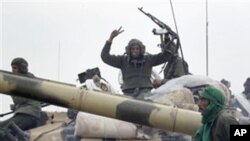Forces loyal to Libyan leader Moammar Gadhafi pounded rebel strongholds Wednesday, as the U.N. Security Council began discussing a resolution to set up a "no-fly" zone over the country.
Witnesses say government shelling of the opposition-controlled western city of Misrata killed at least five people. Pro-Gadhafi forces also pounded the eastern town of Ajdabiya, but rebels denied government claims that it had regained control of the town.
Ajdabiya is the last large town on the road to the opposition's eastern stronghold of Benghazi. The Libyan government urged Benghazi residents to hand over weapons and support a government advance on the city.
The International Committee of the Red Cross said the latest fighting has prompted it to withdraw its aid workers from Benghazi and relocate them to the city of Tobruk, farther to the east. The ICRC was among the only aid agencies with a presence in Benghazi. It appealed to all warring sides in Libya to "spare civilians and medical staff."
Some Western powers were pressing for quick passage of a U.N. Security Council resolution to establish a no-fly zone over Libya and authorize other steps in support of the rebels. The lightly armed and poorly organized opposition fighters have lost ground repeatedly in recent days to Mr. Gadhafi's army, with its aircraft, tanks and heavy weapons.
However, some Security Council members, including Germany and Russia, have expressed doubt over the implementation and potential effectiveness of a no-fly zone. There have also been calls for Arab countries to participate in the implementation if one is approved.
U.S. Secretary of State Hillary Clinton told reporters in Cairo that Washington hopes for a vote on the Security Council resolution "no later" than Thursday. Britain, France and Lebanon introduced the document, with the support of the Arab League.
French President Nicolas Sarkozy sent a letter to Security Council members, urging them to come together without delay to "save the martyred people of Libya." He said the worst outcome would be to allow "the force of arms" to overrule the decisions of the Arab League and the Security Council.
U.N. Secretary-General Ban Ki-moon called for an immediate cease-fire in Libya. A spokesperson for the U.N. chief says Mr. Ban is "gravely concerned" about the increasing military escalation by government forces, and indications of a planned assault on Benghazi.
Mr. Gadhafi's son, Seif al-Islam, said in a television interview that whatever decision the council takes it will be too late. Seif al-Islam told EuroNews that pro-Gadhafi forces are almost to Benghazi and that within 48 hours everything would be finished.
In another development, The New York Times says four of its journalists have gone missing while reporting on the conflict. The newspaper says it was last in contact with the group on Tuesday. The four include Pulitzer Prize winner Anthony Shadid, reporter Stephen Farrell and photographers Tyler Hicks and Lynsey Addario.
New York Times executive editor Bill Keller said the Libyan government has told the newspaper it is trying to determine the whereabouts of the journalists. He expressed gratitude for what he said is Tripoli's assurance that the four-person team will be released promptly and unharmed if captured by government forces.
Libyan Forces Pound Rebel Areas, UN Security Council Meets




